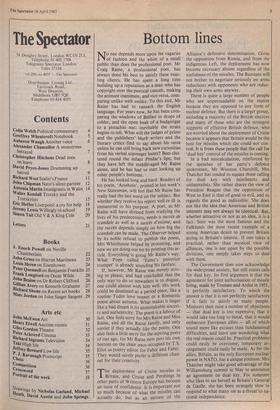Bottom lines
No one depends more upon the vagaries of fashion and the whim of a small public than does the professional poet. Mr Craig Raine, a professional poet, has always done his best to satisfy these exac- ting clients. He has spent a long time building up a reputation as a man who has copyright over the poetical conceit, making the animate inanimate, and vice versa, com- paring unlike with unlike. To this end, Mr Raine has had to ransack the English language. For years now, he h'as been com- paring the windows of Belfast to drops of solder, and the open beak of a budgerigar to a pistachio nut: inevitably the strain begins to tell. What will the judges of prizes and the publishers' blurb writers and the literary critics find to say about his verse unless he can still bring back new curiosities from his verbal scavenger hunts? Bees clut- tered round the infant Pindar's lips; but they have left the middle-aged Mr Raine alone, and he has had to start looking up other people's bottoms.
He has looked long and hard. Readers of his poem, `Arsehole', printed in last week's New Statesman, will feel that Mr Raine has really had the last word on the subject. But whether they receive his report well or ill is immaterial to his purpose. A poet, as Mr Raine will have divined from studying the lives of his predecessors, needs a succes de scandale as well as a succes d'estime, and the succes depends simply on how big the scandale can be made. The Observer helped by its noble refusal to publish the poem, Mrs Whitehouse helped by protesting, and now we are doing our bit by printing this ar- ticle. Everything is going Mr Raine's way. What Pope called 'Fame's posterior trumpet' is already sounding his fanfare. If, however, Mr Raine was merely striv- ing to please, and had concluded that the only way to do so nowadays is to disgust, one could almost wish him well. His work could be dismissed as a period piece, like a routine Tudor love sonnet or a Romantic poem about autumn. What makes it linger like a bad dream is its unmistakable sinceri- ty and authenticity. The poem is a labour of
for Mrs Raine and Miss Raine, and all the Raine family, and only lust. One feels sorry sorrier if they actually like the poem. One also feels a little sorry for the aspiring poets of our age, for Mr Raine now puts his own bottom on the chair once occupied by T.S. Eliot as poetry editor for Faber and Faber. They would surely prefer a different chan- nel for their creativity.
The deployment of Cruise missiles in Britain, and Cruise and Pershings in other parts of Western Europe has become an issue of confidence. It is important not so much because of what the missiles can actually do, but as an earnest of the
Alliance's defensive determination. Given the opposition from Russia, and from the indigenous Left, the deployment has now become necessary almost regardless of the usefulness of the missiles. The Russians will not bother to negotiate seriously on arms reductions with opponents who are reduc- ing their own arms anyway.
There is quite a large number of people who are unpersuadable on the matter because they are opposed to any form of nuclear defence. But there is a larger group, including a majority of the British electors and many of those who are the strongest supports of effective British defence, who are worried about the deployment of Cruise because it appears that Britain would be the host for missiles which she could not con- trol. It is from these people that the call for 'dual key' control of the missiles is coming.
In a bad miscalculation, reinforced by the speeches of her party's defence spokesman, Mr Winston Churchill, Mrs Thatcher has tended to equate those calling for dual key with fainthearts and unilateralists. She rather shares the view of President Reagan that the opposition of West to East is that of good to evil, and so regards the good as indivisible. She does not like the idea that American and British interests may not always be identical. But, whether attractive or not as an idea, it is a fact. Suez was the most famous and the Falklands the most recent example of a strong American desire to prevent Britain acting in Britain's interest. If one takes a practical, rather than mystical view of alliances, one is not upset by the possible divisions, one simply takes steps to deal with them.
The Government does now acknowledge the widespread anxiety, but still resists calls for dual key. Its first argument is that the agreement for joint authorisation of missile firing, made by Truman and Attlee in 1951, is perfectly satisfactory. To which the answer is that it is not perfectly satisfactory if it fails to satisfy so many people. Ministers then raise a number of objections — that dual key is too expensive, that it would take too long to instal, that it would embarrass European allies — all of which sound more like excuses than fundamental difficulties, and leave one wondering what the real reason could be. Practical problems could easily be overcome, temporary ar- rangement could easily be made. As for the allies, Britain, as the only European nuclear power in NATO, has a unique position. Mrs Thatcher might take good advantage of the Williamsburg summit in May to announce an agreement on dual key. For someone who likes to see herself as Britain's General de Gaulle, she has been strangely slow to respond to what many see as a threat to na- tional independence.










































 Previous page
Previous page